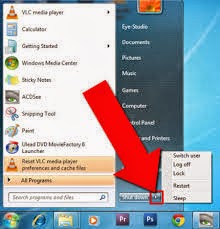Discontinue all unused applications.
A Task bar is on the bottom border of the screen. In the
right side of the TaskBar shows a group of small icons, jointly named as the ‘system
tray’. Each of these icons signify a program that has been at least partially
started or is running . Despite of state, each reasons a reduction of available
memory and processing power, or resources. Closing, exiting or canceling any
unused icon returns those resources to the system, and becomes available for
use by the application(s) started specifically by the user. Go to your task
manager and click on the Process tab. End all process that you can.
Defragment on all hard drives.
Right-click a drive icon then select "Properties" > "Tools". Decide "Defragment" to let the service clean up fragmented files and merge free space on the drive. It should be done at least once per week, or more often if the device is used a lot. A few versions of Windows allow for the scheduling of this service, and in those cases might be set to run automatically without ever having to physically run again. This procedure may take wherever from more than a few minutes to an hour or more to complete depending on size of the drive’s and amount of idle capacity / free space. Consider starting the defragment process so that it will run over night or prior to logging off. After achievement the speed of hard drive read and write times may improve appreciably. There are also separate defragmenting programs available PURAN -DEFRAG
Blank the Recycle Bin
Just deleting files from the disk doesn't really delete them
at all, rather they are moved to a temporary holding area on the hard drive for
easy restoration. This area is called the Recycle Bin and is usually displayed
on the Desktop. Analysis the contents before emptying. Once emptied, the space
on the hard drive that the data engaged is made available for reclaim and the restitution
of files emptied from the recycle bin becomes enormously difficult. Reminder that
this will only speed up your computer if the hard drive is nearly full.
Run Disk Cleanup.
Windows contains a default disk washing tool,” Disk Cleanup”.
This scans your system for needless large files such as program installers,
junk file, temporary Internet files, log files and extra. On my system, the
largest amount of data by distant was taken up by Temporary File 2560 KB that
could mean the difference between a slow and a lively computer. Those control
the PC Tune-up utilities have posted a good case for disk space affecting
performance.
Do a shut down/reboot your PC.
Various programs do not leave go of memory properly when
they shut, That is the cause for some operating systems. Even burden a warm
restart will not release some of the memory drivers and other center programs
had billed. The PC has to be totally shut down and then restarted. When a
program is asking for some memory, a space would be billed for it by the
operating system such as “Windows”. The billed memory cannot be used by any
other programs. All Programs naturally go their memory space but a few programs don't this. This
is recognized as a "memory seep out ", which is reason by a
programming error. A memory seep out is easily manifest, when a program uses up
a strangely high amount of assets because it keeps on asking for more and never
gives back any of the billed memory space. User work around is to come to an end the
program , but some processes cannot be closed such as center processes. Closing
down the system will have the operating system not remember which memory
locations are not free. So do not try the next boot, all memory locations are gratis
to use.
Uninstall all unnecessary submissions that are no longer needed.
Some files are printed in the Windows directory formation and
fifteen or more changes are made to the Windows Registry file, when
applications and games are installed to a Windows computer. Most of these
changes are not willingly clear to the PC operators. So uninstall all unnecessary
applications through the Control Panel's "Add or Remove Program" section.





